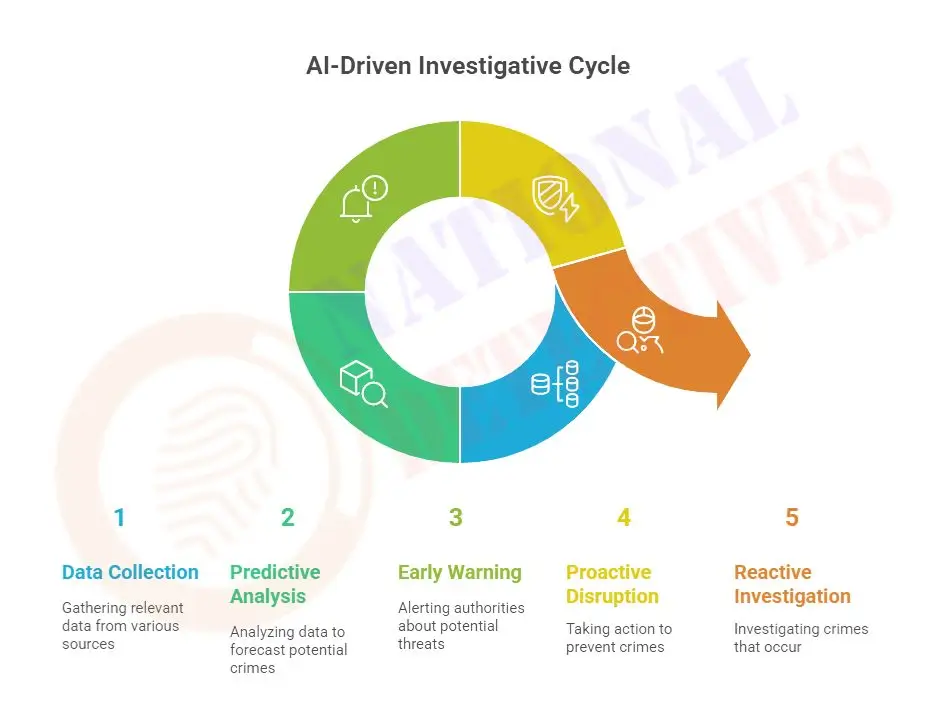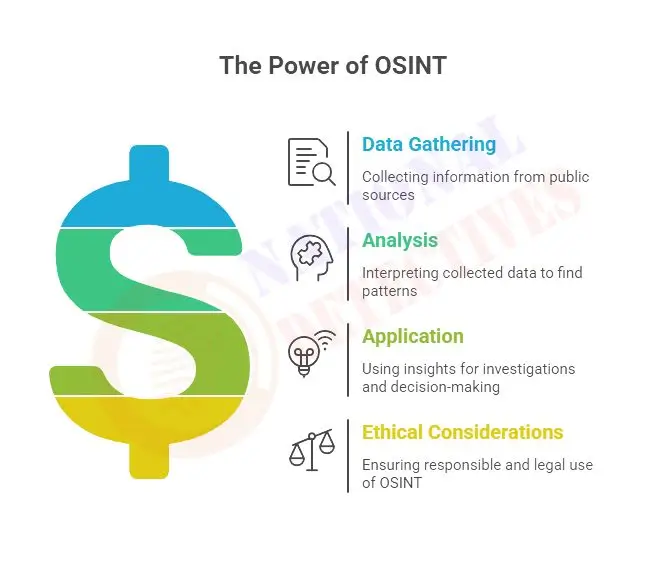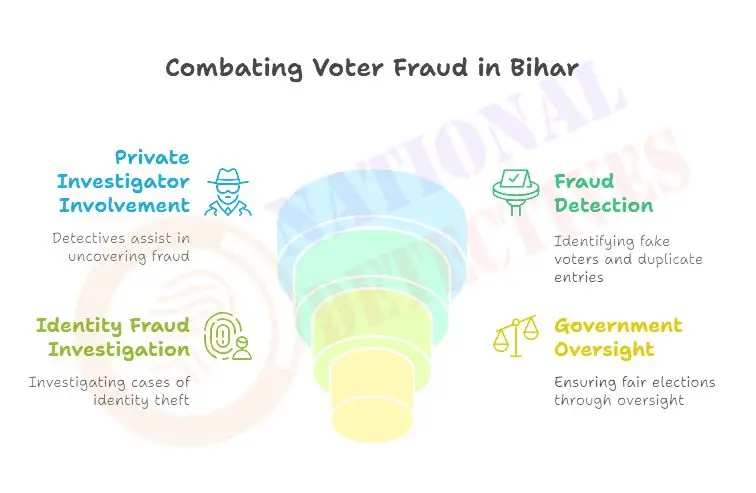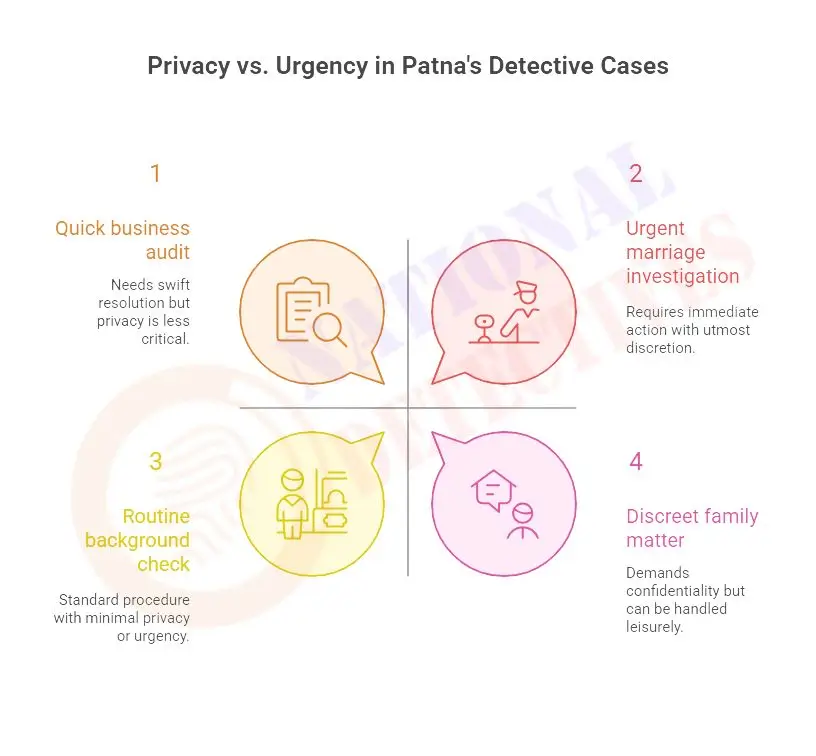
AI (artificial intelligence) is revolutionizing investigations across sectors in an ever more data-driven world. From financial fraud and cybercrime to organized rackets, predictive investigations facilitated by AI have revolutionized investigative practices from reactive inquiries into proactive ones that use artificial intelligence (AI). Instead of waiting until crimes occur before trying to trace culprits later, professionals now utilize AI for early warning and disruption of illegal activities ahead of time - thus changing how professional investigators and detectives approach investigations altogether. This article delves into how artificial intelligence (AI) is revolutionizing investigative practices, with special reference to how private investigators and detectives in India are adopting this revolutionary tech to stay abreast of fraudsters and organized criminals.
Understanding Predictive Investigations
Private investigator Using AI and involve using data, behavioral analysis, machine learning and pattern recognition techniques proactively in order to anticipate crimes or fraud before they take place. Their aim is not just faster resolution of cases but preventing new ones altogether - in traditional investigations actions follow an incident; AI-powered approaches take preventive steps before incidents escalate further.
Key areas where predictive investigations have proven their worth
Financial and banking fraud and theft, insurance scams, cybercrime and phishing attacks, retail theft organized retail theft electoral manipulation identity fraud as well as crime hotspots
Modern Investigations now utilize AI as part of their toolbox for investigation.
1. Data Mining and Pattern Recognition
AI systems can scour through vast amounts of structured and unstructured data quickly, quickly recognizing irregularities which humans would miss, such as repetitive transactions, shell accounts or discrepancies in user behavior that human investigators might miss. In an auditing investigation for financial fraud cases for instance, AI would likely spot patterns like repetitive transactions, shell accounts or inconsistencies with user behaviors as part of its analysis process.
2. Behavioral Modeling
AI can analyze past actions to predict future behavior, creating risk profiles using factors like frequency, timing, transaction size and interaction channels - an indispensable technique in cases involving insider fraud, organized crime or employee misconduct.
3. Natural Language Processing (NLP)
AI can analyze social media posts, emails, customer service complaints or chat logs using Natural Language Processing to detect threats such as hate speech and planned fraud schemes. Private investigators utilize NLP analysis tools in monitoring online threats or relationship disputes or blackmail cases.
4. Link Analysis and Network Mapping
AI can create visual maps showing connections among suspects, accounts, locations and events to quickly uncover racketeering activities or conspiratorial schemes in India - making life simpler for detectives in their attempts at uncovering real estate fraud or matrimonial scams.
5. Facial Recognition and Biometrics
AI systems have long been utilized by law enforcement and licensed private detectives alike as an invaluable tool in tracking individuals through facial recognition, iris scans, gait patterns, voiceprints or voiceprint analysis. Law enforcement uses these tools in their search efforts for criminal suspects or missing people as they track down any fugitives from justice who evade detection, stalkers or unknown squatters who escape capture or simply go missing altogether.
6. Geospatial Intelligence and Predictive Policing
Artificial intelligence can use crime patterns from geography and time to predict where an imminent crime may strike next, providing urban policing services and private security firms a powerful way to identify vulnerable areas more quickly and accurately.
Application in Fraud and Organized Activity Detection
1. Banking and Financial Sector
AI tools have proven valuable in detecting anomalous transactions like account takeovers, money laundering operations or synthetic identities. With predictive analytics tools at their fingertips auditors and investigators can focus on high-risk cases faster and cheaper - helping reduce time and costs to achieve optimal efficiency in auditing operations and investigations.
2. Fraud in Insurance and Healthcare
Artificial intelligence algorithms analyze claim histories, customer demographics and third-party vendor information in order to detect suspected fraudulent cases in insurance and healthcare sectors. Insurance detectives increasingly rely on AI when investigating staged accidents or false medical claims submitted for reimbursement by their clients.
3. Online and Cybercrime
Its Predictive algorithms help anticipate phishing campaigns, data breaches and malware attacks by analyzing behavior across networks. Cybercrime investigators use AI technology to detect botnets or fake e-commerce websites.
4. Retail and E-Commerce
AI can use customer behavior analysis, refund requests and delivery patterns to detect refund fraud schemes such as internal theft or reseller manipulation. Detective Agency In India working at large platforms often employ AI dashboards for monitoring suspicious sellers or affiliate fraudsters.
5. Electoral and Identity Fraud
AI-powered identity verification, document analysis, and voter roll scanning tools have become effective tools in India's electoral fraud investigation efforts in high stakes elections to detect any false registrations or illegal deletions of registered voters.
Indian Private Investigators Leveraging AI for Investigative Work
India's private investigation landscape is rapidly shifting. While traditionally dependent upon surveillance, manual verification, and local intelligence sources for their investigations, modern private detectives in India are turning increasingly towards AI-powered tools that expand their abilities.
1. Matrimonial and Background Checks
AI tools are increasingly being deployed to provide accurate background checks on prospective marriage partners or criminal defendants in India. Detectives use traditional fieldwork along with AI to validate income claims, marital statuses or criminal histories compiled online profiles or court databases and financial details that allow accurate background investigations to take place.
2. Missing Persons and Digital Trails
AI can aid law enforcement officials in investigating missing person cases by analyzing mobile tower pings, social media activity, travel bookings and mobile tower pings to find leads that lead back to them. In addition, facial recognition software powered by AI assists with scanning CCTV footage across cities for signs of the person.
3. Corporate Espionage and Employee Monitoring
AI can use email logs, system access patterns and digital footprint analysis to detect data leakage or corporate spying activities; private detectives use AI technology for internal HR investigations as well.
4. Asset Tracing and Forensic Accounting
Machine learning models scour asset flows, corporate records and tax data in order to detect hidden assets such as shell companies or benami holdings.
AI-Driven Investigations Have Their Share of Challenges
AI offers many powerful capabilities; however, it also presents its own set of unique challenges:
Privacy and Ethics: Data collection and analysis must comply with privacy laws and ethical norms to avoid legal actions or rights violations, such as misuse of collected data for unethical or improper uses. False Positives: Artificial Intelligence systems may mistakenly flag innocent individuals or entities leading to unnecessary scrutiny from authorities.
Data Quality: Improper or biased data can skew AI predictions, necessitating manual oversight. Skill Gaps: Private investigators often lack training in using AI tools, necessitating either upskilling sessions with data scientists or collaboration on training initiatives with them.
Collaboration Between Tech and Field Personnel
AI should complement, rather than replace human expertise for maximum impact. Human expertise such as intuition, local knowledge and ethical judgment cannot be replaced by AI alone - while billions of data points may pass through AI systems at lightning speeds it still takes someone with understanding context, motive and emotion to put things into context and understand nuances like context motive and emotion.
Investigative agencies have evolved in response to technological change by merging.
AI-driven dashboards combined with manual surveillance; predictive analytics with eyewitness interviews and eyewitness statements, digital forensics with traditional documentation and real time alerts with physical stakeouts
As Indian private investigation agencies evolve, partnerships between cybersecurity firms, forensic analysts and AI developers continue to strengthen. Training workshops, tech integrations and joint case studies have become common practices.
Conclusions of Investigations Are Hybrid
AI-powered predictive investigations mark an unprecedented shift in how crime and fraud is addressed. Private investigators in India use these powerful tools with unmatched reach, efficiency and foresight - however this technology will only ever be as good as its users!
Private investigators in Delhi represent the future - professionals who combine intuition with innovation, street smarts with software. Crime has evolved and investigations must adapt as well. Protecting corporate assets, uncovering fraudsters or upholding justice are among the many roles detectives will be expected to fulfill; their next-generation colleagues must not only seek clues but anticipate them.



